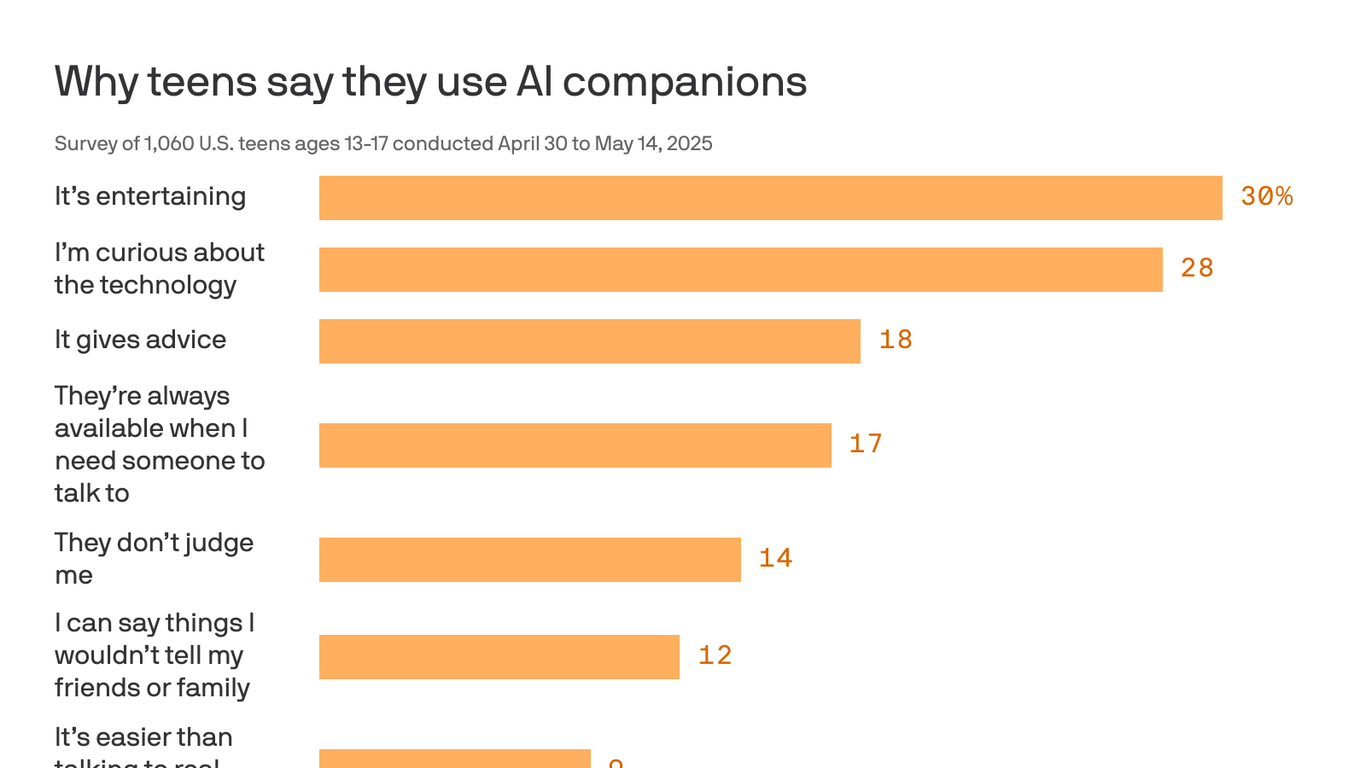A Common Sense Media study from April–May 2025 found that 72% of U.S. teens (ages 13–17) report using an AI companion bot at least once, and 52% use one regularly (a few times per month or more)arXiv+15Axios+15BSS+15.
Among that group, roughly one-third (about 34%) said they’ve felt uncomfortable with something the bot said or did, and another third said they’ve chosen to discuss serious personal matters with the AI instead of talking to a real person Phys.org+5Axios+5Business Times+5.
Additional context:
Around 30% of teens use AI companions primarily for entertainment or curiosity, while 24% report sharing real personal information like their name or location FOX 4 News Dallas-Fort Worth+6Phys.org+6inkl+6.
Though these bots can feel emotionally supportive (with ~31% of teens finding conversations “as satisfying or more satisfying” than with humans), a majority (67%) still prefer human interaction WIRED+15FOX 4 News Dallas-Fort Worth+15Education Week+15.
Why it matters
These figures highlight how AI companions are now a mainstream part of teenage life — but they also raise important questions about safety, emotional development, and boundary between human and machine interaction. Common Sense Media recommends stronger age-verification, improved content moderation, and increased AI literacy education for youth psychologytoday.com+8Axios+8Business Times+8.
Summary Snapshot
| Metric | Percentage |
|---|---|
| Teens who've tried AI companions | 72% |
| Regular AI companion users | 52% |
| Experienced discomfort with bot | ~34% |
| Shared personal info with bot | ~24% |
| Use bots to discuss serious issues | ~33% |
| Teens finding bots as satisfying as humans | ~31% |
Here’s how AI companion usage breaks down among U.S. teens by age and gender, based on the recent Common Sense Media survey and related findings:
🧒 Age Differences
13–14-year-olds are more likely to trust AI companion advice than older teens (15–17)Statista+12Phys.org+12Axios+12.
For the full 13–17 age range:
👩👦 Gender Differences
Social skill transfer: Among AI companion users:
45% of girls say they’ve applied social skills learned from bots to real life.
34% of boys report the same Lifewire+15FOX 4 News Dallas-Fort Worth+15AI Girlfriends+15.
Privacy & self-disclosure:
24% of all teens have shared personal info (real name, location, secrets) with AI bots — the gender split was not specified The Times+11FOX 4 News Dallas-Fort Worth+11arXiv+11.
Broader generative AI context (not companion-specific):
Boys are more likely to use AI tools than girls, but for companion bots, both genders are active—with girls benefiting more in social skill development .
📊 Key Takeaways by Segment
| Demographic | Usage | Trust & Emotional Use | Social Impact |
|---|---|---|---|
| Ages 13–14 | More trusting of bots' advice | Higher trust than older teens | — |
| Ages 15–17 | Still high usage, more skeptical | Less trusting compared to younger peers | — |
| Girls | Similar usage rates | Transfer social skills more (45% vs. boys’ 34%) | — |
| Boys | More likely to use AI tools generally | — | — |
⚠️ Why these gaps matter
Younger teens' higher trust could make them more vulnerable to giving personal data or being influenced by bots.
Girls reporting more benefit in social-skill practice suggests AI companions may provide social training that’s particularly impactful for them.
Still, overall AI use is widespread across gender lines, and both boys and girls are engaging enough that safety measures need to be inclusive.
Here's relevant news on teen AI companion use







No comments:
Post a Comment